| INTERVIEW WITH BUDDY COOPER
|
|
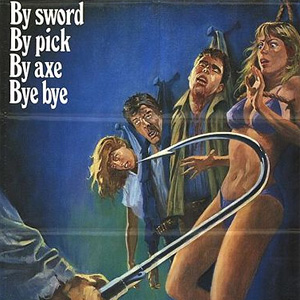 | Buddy Cooper wrote, directed, and produced The Mutilator, and it is his only film credit on the Internet Movie Database. The same forum regular (Skaboi - his real name is George) who first tasked me with reviewing "The Mutilator" also put me in contact with Mr. Cooper. It was a great opportunity to find out the story behind the film, along with how and why Mr. Cooper wanted to make a slasher movie.
Something interesting I found out when I asked about a DVD is that, right now, there is no legitimate DVD release of "The Mutilator" anywhere. Every DVD, including the Vipco ones that are available on region 2 DVD from Amazon.co.uk, are pirated copies. Pretty horrible to hear, especially in light of how much Mr. Cooper put on the line to make the movie. Read on for the whole story.
Interview Date: 24 May 2008
|
|
| Andrew:
| You wrote, directed, and produced "The Mutilator." What gave you the idea for the film and how long did it take to evolve from an idea into a script, and finally into a movie?
|
| Buddy Cooper:
| I had always wanted to make a movie. One fine day, a Tuesday I think, the day after Labor Day, I was walking on the beach with a pal kicking around movie ideas and it came to me that a horror picture in which the killer used implements and devices commonly found in or near the water would be something different. (The decision to make a horror picture was an economic one. At the time Variety was reporting that 30% of all movie tickets sold were for horror pictures. I was of the opinion that a low budget horror picture would give me the best opportunity to recoup the cost of the picture. I was almost right.)
I was practicing law at this time. I would get up early for me, 5:30, and make it to the office by 6:00. I would dictate the screenplay until 8:00, at which time I would begin practicing law. My secretary was an excellent typist. To show off, if we asked her to, she could type 100 words a minute. At 4:00 in the afternoon I would quit practicing law and I would review the pages which I had dictated that morning, which my secretary would have typed by then. I say typed, but I mean punched into a computer. I don't recall specifically how long it took, but once we got rolling from time to time we could do 10 pages in a day. I would guess that the first draft took less than a month.
After that it was rewritten a few times. My friend and co-director, John Douglass, who teaches screenwriting as well as motion picture production at the American University in Washington, D. C. was very helpful with the rewrites. I would guess that the "finished" screenplay was done in about 2 months.
| |
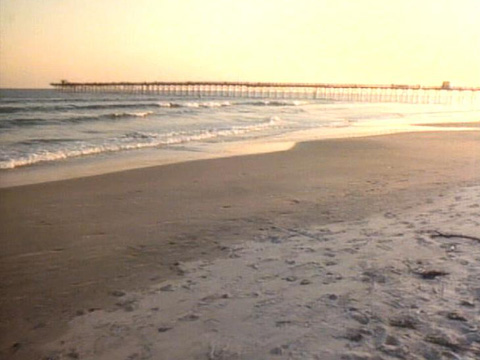 | "I had always wanted to make a movie. One fine day, a Tuesday I think, the day after Labor Day, I was walking on the beach with a pal kicking around movie ideas and it came to me that a horror picture in which the killer used implements and devices commonly found in or near the water would be something different."
|
|
| Andrew:
| What was the film's budget and how long did shooting and post-production take?
|
| Buddy Cooper:
| The film's budget was $84,000. We passed that during the first week of shooting. I borrowed the balance of the cost of the movie from Wachovia Bank and I maxed out a couple of credit cards. Wachovia was helpful in lending the money to me. Without it I would not have been able to finish the movie. Frankly, Wachovia was a little bit nervous. The day I paid off the loan, practically every officer in the bank stopped by the office to shake my hand and congratulate me. The final cost through the first acceptable answer print was $450,000.
The casting took place during the winter, as did the choosing of crew members. The first crew member was Peter Schnall, Director of Photography. Peter was very instrumental in suggesting other department heads. Peter and his department heads came from New York City. John Douglass brought some recently graduated students, graduate students and interested undergraduates to fill out the various departments. All of that as well as pre-production was done by mid-to-late April. The shoot began in early May. We had 29 shooting days. After that it took about 6 months to complete post-production.
| |
| Andrew:
| For making a movie, $450,000 is still an amazing budget. However, most movies are not financed by one person. Were you ever a little nervous as the production progressed, and what was it like to keep increasing the budget as the days went by? Any discussions with family and friends over putting that much on the line to make a film?
|
| Buddy Cooper:
| Yes, I was definitely nervous - more than a little as the production progressed. I ran out of money. I borrowed more. I maxed out two credit cards. Wachovia Bank was very helpful. Wachovia was perhaps even more nervous than I was - they had extended that much money to me on my signature without getting any additional collateral (although they felt I was good for it). The money ($80,000) I had to make the movie disappeared right away. As the days went by I figured out how much the shoot was costing on a per minute basis and it was, at the time, staggering.
| |
| Andrew:
| Tell us about the casting and the people cast for the different roles. Also, did any of the actors or actresses stand out to you?
|
| Buddy Cooper:
| We began casting the picture locally and expanded our search geographically until all the roles were filled. Ralph and his girlfriend, played by Bill Hitchcock and Connie Rogers, were cast here in Carteret County, NC. Ben Moore who played the cop was from Morehead City. Ruthie Martinez who played Pam came from Raleigh, I think. As I recall she was going to school at East Carolina in Greenville, NC. We had an open call in Greenville and she attended. There were other local cast members. Fred Tillery from Morehead City played the convenience store clerk and the woman in the convenience store, whose name I can't remember at present, was from Morehead City. Some of the smaller roles were played by local people. The woman and child entering the convenience store, the doctor and the nurse were all local. We continued to expand our search and wound up in New York City where we cast Frances Raines and Matt Mitler.
Oh, Big Ed, how could I forget him? Big Ed was played by Jack Chatham of Greensboro, NC.
(An interesting aside about Ben, in addition to his being famous for appearing in the movie 2,000 Maniacs, is this: When we went to New York to cast, Ben went with us. It was on that trip when I met with Peter Schnall who explained to me how much the picture was going to cost. It was considerably more than I could afford. I was very down about the whole project. We got in the car to come back. Ben and Neil Whitford were in the front seat. I was in the back seat, depressed.
Ben started some of his shtick in midtown Manhattan and started singing old songs. I guess by the time we were off the New Jersey turnpike I was singing along. My spirits were revived and we went on to make the movie.)
All of the actors and actresses performed admirably, especially considering that Ben Moore was the only true professional in the troupe. In addition to Ben I think Bill Hitchcock is generally mentioned by most people who talk about the movie as being their favorite actor.
| |
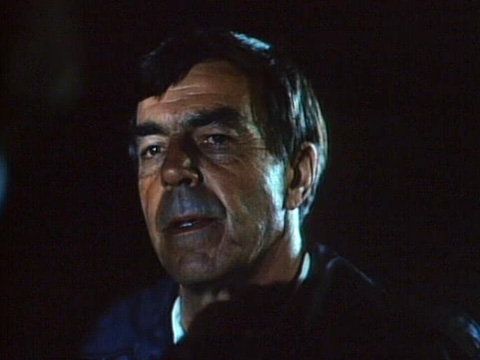 | "Ben Moore who played the cop was from Morehead City."
"I was very down about the whole project. We got in the car to come back. Ben and Neil Whitford were in the front seat. I was in the back seat, depressed. Ben started some of his shtick in midtown Manhattan and started singing old songs. I guess by the time we were off the New Jersey turnpike I was singing along. My spirits were revived and we went on to make the movie."
|
|
| Andrew:
| Looking back on it now, is there something you would have changed about the movie?
|
| Buddy Cooper:
| In hindsight, I believe that the script is the weakest part of the movie. If I were to do it over again I would spend a lot more time rewriting and polishing the screenplay. The screen values produced by the cast and crew and the edit and sound edit are all of very superior quality. While I'm not particularly proud of the screenplay, I am proud to have been part of a collaborative effort which produced such high screen value. Also, I would have begun editing the picture on the set. I didn't know that you were supposed to start editing before the shoot was finished. We could have saved a lot of time. This is an example of how ignorant I was going into this project. On the other hand, I learned an awful lot about making movies.
| |
| Andrew:
| Good grief, where did all of the empty liquor bottles that covered the counter and tables in the beach house come from? There must have been fifty or more.
|
| Buddy Cooper:
| The empty liquor bottles in the scene you mentioned came from a crew party the night before. No, seriously I don't recall. I expect we went around to restaurants and bars and begged some bottles from them.
| |
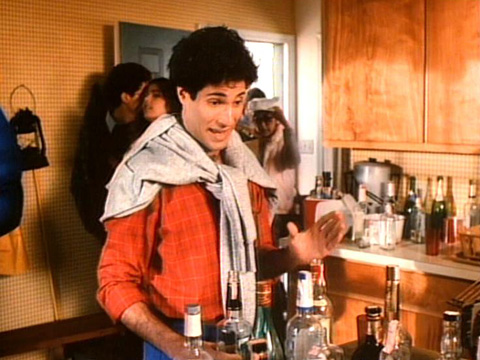 | "The empty liquor bottles in the scene you mentioned came from a crew party the night before. No, seriously I don't recall. I expect we went around to restaurants and bars and begged some bottles from them."
|
|
| Andrew:
| For the audience, the transition between the two time periods is pretty quick. Ed accidentally kills his mother, but we next see him as a college student and his father is about to snap and become "The Mutilator." Was there any story lost, either by editing or the filming schedule, between those two points?
|
| Buddy Cooper:
| No. That was the way it was written, shot and edited. I thought that the audience would be able to keep up with that time transition without wasting any screen time explaining it.
| |
| Andrew:
| If you could go back and remake it, what changes would you make to the screenplay? Would they be sweeping rewrites, or limited (such as changing some of the spoken dialog)?
|
| Buddy Cooper:
| I would rewrite the screenplay. It was designed to begin slow and build to a high level, which I think it does. Now, I think the first part of the picture is a little too slow. If I had a chance to do it over I would make act one much more exciting. I would start at a higher level and try to maintain a high level of intensity throughout.
| |
| Andrew:
| Overall, the various death scenes are not too surprising to someone who watches lots of movies, including slasher films. However, Sue's was the exception. It is the only one that really seems cruel (in the context of horror movie deaths). The killer actually impales her with the gaff in a very uncomfortable place, and her reaction immediately prior to the piercing is really understated. Compared to the other deaths, this one stands out as being the "odd duck." Is there any reason why Sue's demise was so brutal?
|
| Buddy Cooper:
| No, in keeping with the motif of doing these young people in using nautical implements, the huge gaff seemed like a natural. Now why I chose to gaff Sue where I did, I can't explain - it was just a horrible thing to think about. Certainly in retrospect, I should have chosen differently.
| |
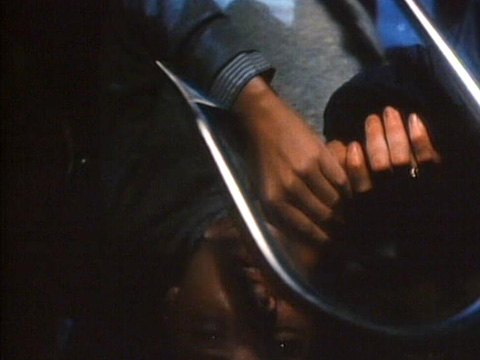 | "...in keeping with the motif of doing these young people in using nautical implements, the huge gaff seemed like a natural."
|
|
| Andrew:
| The opening song, "Fall Break," is a cheery tune, making it pointedly out of place in a bloody slasher movie. However, it does create a counterpoint, because it plays as the group of college kids heads out to the beach house, not knowing that an insane killer is waiting for them. How did it come to be in the film?
|
| Buddy Cooper:
| The opening song, "Fall Break," was written especially for the movie. Michael Minard, the music director of the picture, wrote the song. It was designed to be of the type known locally as beach music. I think he succeeded admirably. He co-wrote the lyrics with the guy who wrote "Under the Boardwalk" and whose name I cannot recall right now. It's been a while.
Michael Minard composed the entire score for the picture, produced the theme song (which was available on 45 RPM singles), directed small groups of musicians and performed most of the music himself. He's a genius.
| |
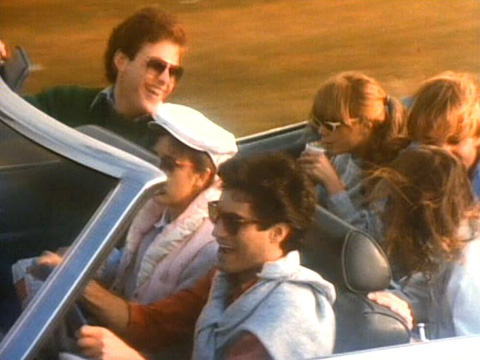 | "The opening song, 'Fall Break,' was written especially for the movie. Michael Minard, the music director of the picture, wrote the song. It was designed to be of the type known locally as beach music. I think he succeeded admirably."
|
|
| Andrew:
| Lastly, but not least, open floor for you. Is there anything you would like to say to fans of "The Mutilator," horror films, or anyone considering making a movie?
|
| Buddy Cooper:
| Well that's really two or three questions.
To the fans of "The Mutilator" I would say thank you very much. We had an awful lot of fun making this picture. It was designed for the gore fans specifically. It was intended to be fun, although certain factions of the public didn't realize that. And if any movie goers out there or fans had fun with it, then we are all gratified. Thanks.
To someone considering making a movie, I'd have to say, "Have at it!" If you are serious about it, just get it done anyway that you can. That's the bottom line. Along the way you should have a good screenplay-one better than The Mutilator. It should be tight, it should tell a story, it should hold together, and it should proceed through the standard three-act structure. The characters must be interesting. Characters carry stories so much more than plot does. Talk to people who have done it-most of them would be delighted to give you advice (probably more advice than you want to receive). It will be a lot of hard work. It will leave you high sometimes and down sometimes, but stick with it. Keep your goal in mind and work towards it. Get the thing in the can anyway you can-whatever it takes.
Andrew, thank you for this opportunity. It has been a pleasure.
| |
My personal thanks to Mr. Cooper for taking time to answer the interview questions, and for making "The Mutilator" in the first place. Hearing the stories behind some of the films I review is always a treat, and sometimes surprising. Until Mr. Cooper told me that the song "Fall Break" was written for the movie, I believed it was a popular number by a local beach bar band that had been licensed for use in the film. The Wachovia Bank officers stopping by to shake his hand after he paid off the loan was also a surprise, but it has to feel good to have bucked the odds, made a movie, and realized that everyone was hoping you would be able to do it all along. My best wishes to Buddy Cooper, and hopefully we will see a DVD release of "The Mutilator" in the near future.
|
| |
|
|
|
| Badmovies.org is owned and operated by Andrew Borntreger. All original content is © 1998 - 2014 by its respective author(s). Image, video, and audio files are used in accordance with Fair Use, and are property of the film copyright holders. You may freely link to any page (.html or .php) on this website, but reproduction in any other form must be authorized by the copyright holder. |
|
|
